
|
For several years now, there has been a topic of much debate in the workforce: How much experience should entry-level jobs require? Many people believe that entry-level positions, which are often low-paying, shouldn't have stringent requirements when it comes to work experience. Some entry-level jobs require as many as two, three, or even more years of experience, which can be frustrating for job seekers without prior experience in the field.
This phenomenon, known by some as "experience inflation," has made it extremely difficult for some people to break into the workforce. It's a problem that has garnered more attention over the past year with the increasing labor shortage and the continuing problem of unemployment.
We wanted to hear from both employees and hiring specialists about this increasing issue in the job market, so we asked 1,018 entry-level job seekers and 518 hiring managers a variety of questions to get a sense of why this is happening and how employees are feeling about it.
To kick things off, we asked entry-level job seekers what their biggest frustrations with the job-seeking process were. The most common response, with nearly half (47%) of respondents marking it as one of their top frustrations, was job listings with inappropriate experience requirements. Other common frustrations included issues with pay rates, inflexible schedules, and being let down by prospective employers during the application process.
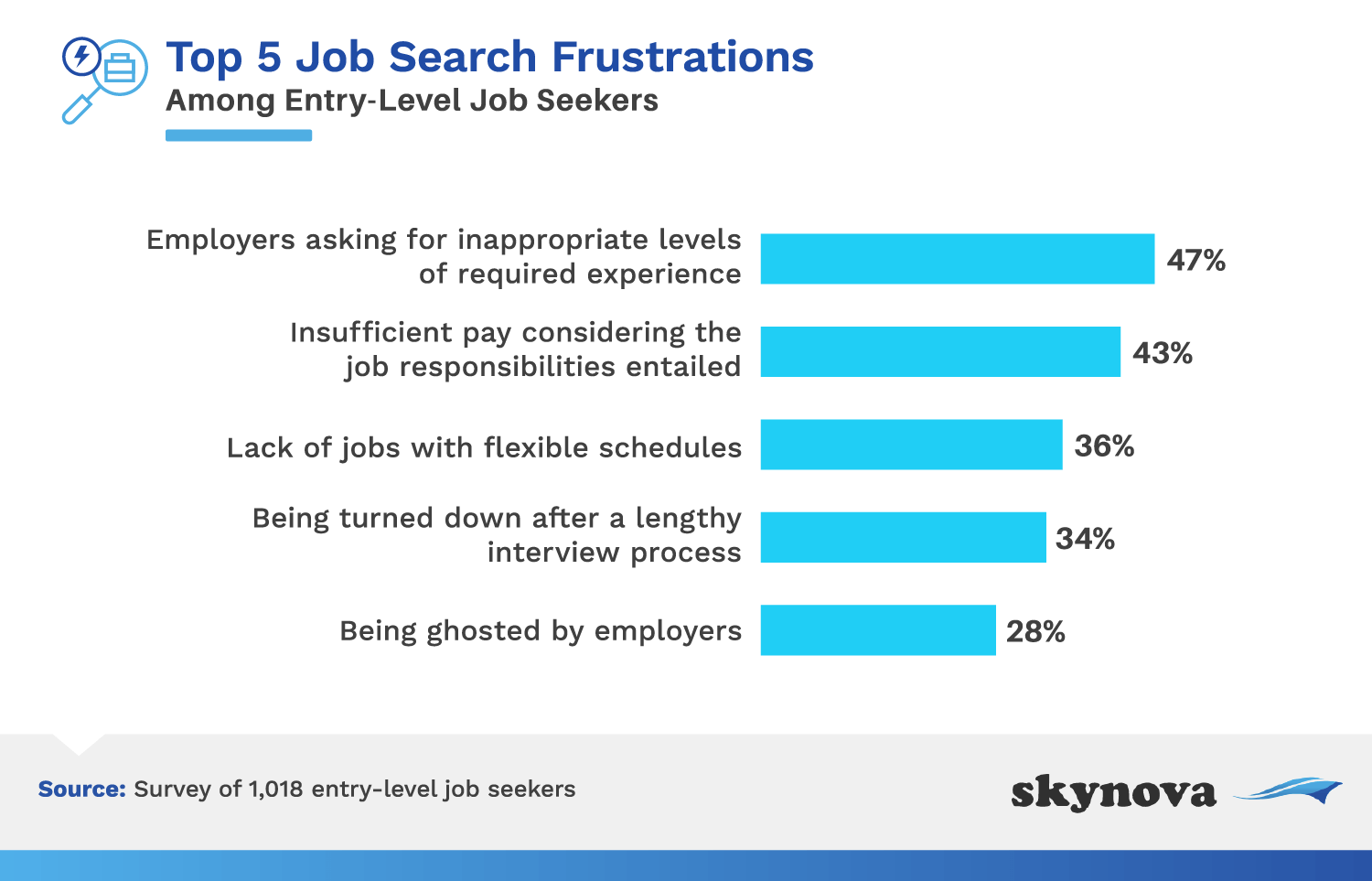
High experience requirements for entry-level positions isn't a new problem for job seekers: A 2019 study showed that 35% of LinkedIn job postings required three or more years of experience. Today, the problem seems to have only gotten worse, with job seekers estimating a rise of 20 percentage points in entry-level listings requiring three or more years of experience compared to the aforementioned study.
 |
Entry-level job seekers estimated that about 55% of listings for entry-level positions required three or more years of related work experience. |
This increase is reflected in the perceptions of veteran job seekers: Three-quarters (75%) of those who had prior experience searching for entry-level jobs reported that more experience is required now for entry-level jobs than in previous years.
These frustrations and the increase in experience needed for entry-level jobs doesn't mean that employees don't understand the need for some type of related work experience. In fact, just 14% of employees surveyed said they don't think any experience should be reasonably required. Most respondents (44%) said that one to two years of experience was a reasonable expectation for an entry-level position. However, job seekers largely agreed that three or more years of prior experience is an unreasonable expectation for entry-level workers. Overall, a vast majority of employees (80%) said that entry-level jobs shouldn't require more than two years of experience.
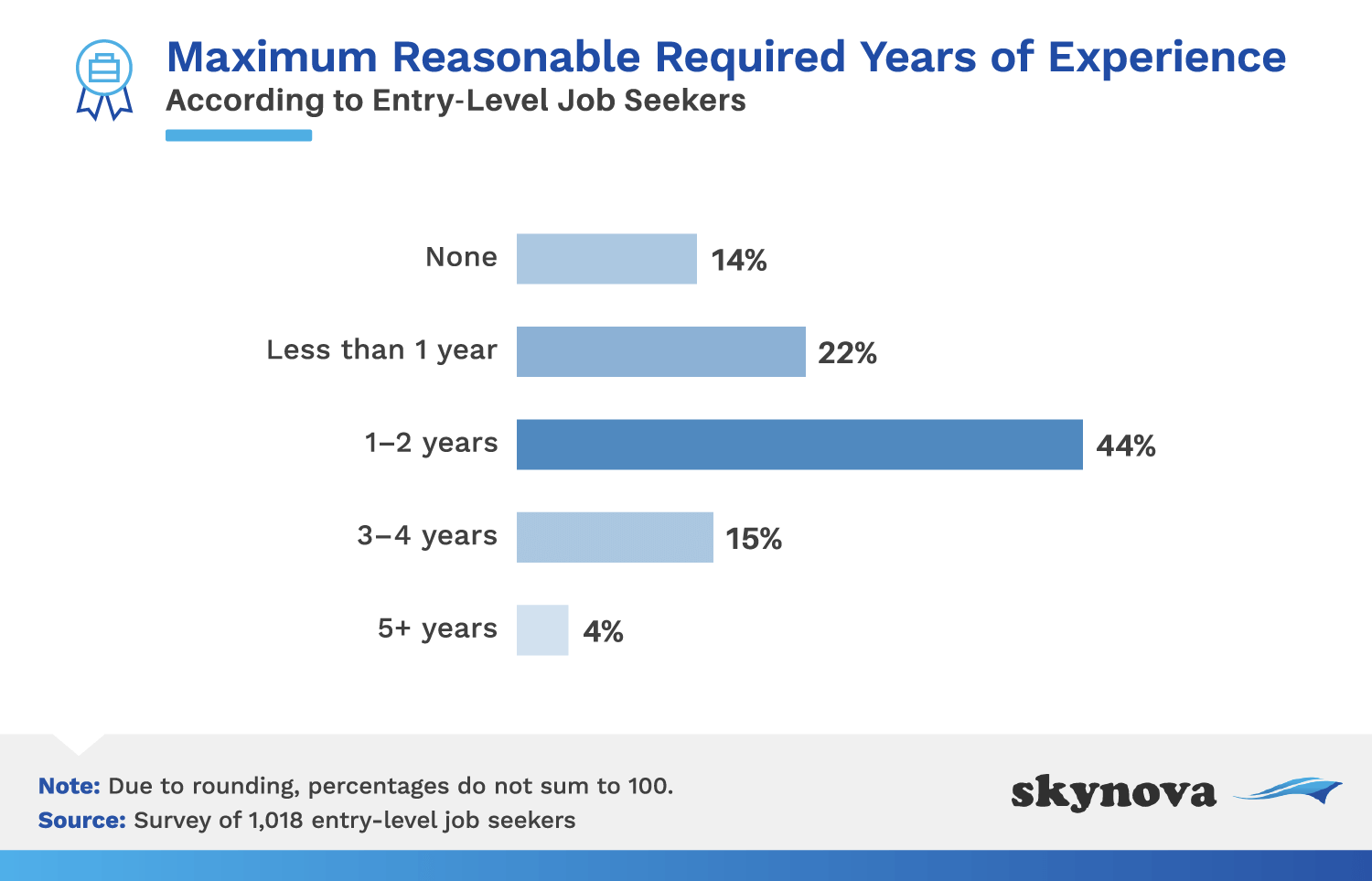
Considering the fact that even college grads often feel unqualified for entry-level jobs, it's understandable that many job seekers would be discouraged by things like experience requirements. Overall, among job seekers, 39% said they feel very or extremely discouraged by entry-level job listings that require multiple years of experience. Among those with less than one year or no experience, 60% said they felt discouraged by the experience requirements in entry-level job listings.
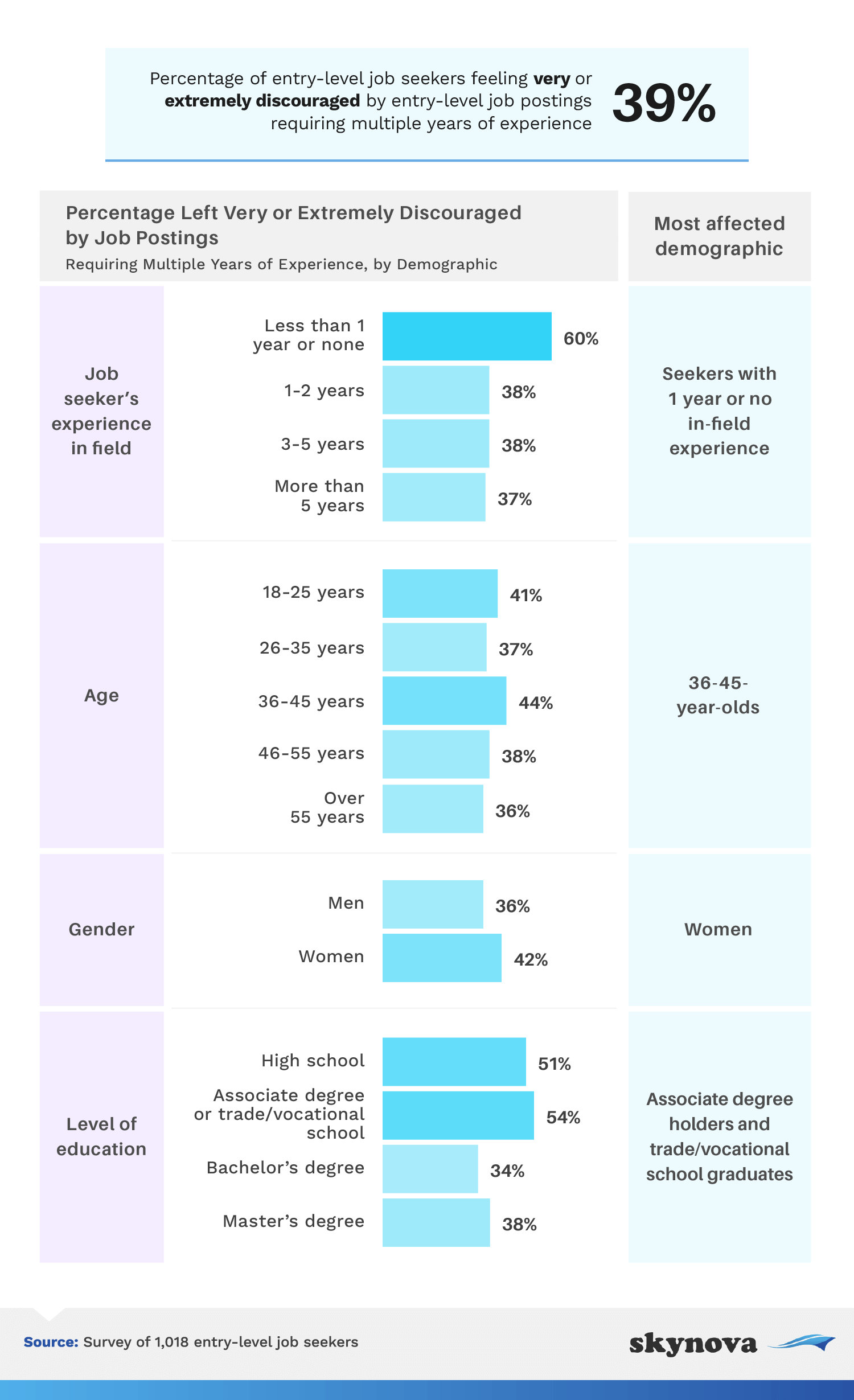
It's thought that one reason for the multiyear experience requirements in entry-level positions is to weed out those with no prior experience whatsoever, and the study shows that this might be effective. However, hiring managers who put these restrictions on their entry-level jobs may be unintentionally excluding other groups as well: Our numbers show that such requirements are also weeding out more of some groups than others.
Given the high levels of discouragement experienced by nearly 2 in 5 entry-level job seekers, it'd be easy to assume that these potential applicants would think poorly of companies that require several years of experience for entry-level positions. Despite these feelings, 46% of employees said their opinion of a company is actually raised when they see multiyear experience requirements for entry-level positions. This may initially be confusing, but the reasoning becomes clearer when the data is broken down further.
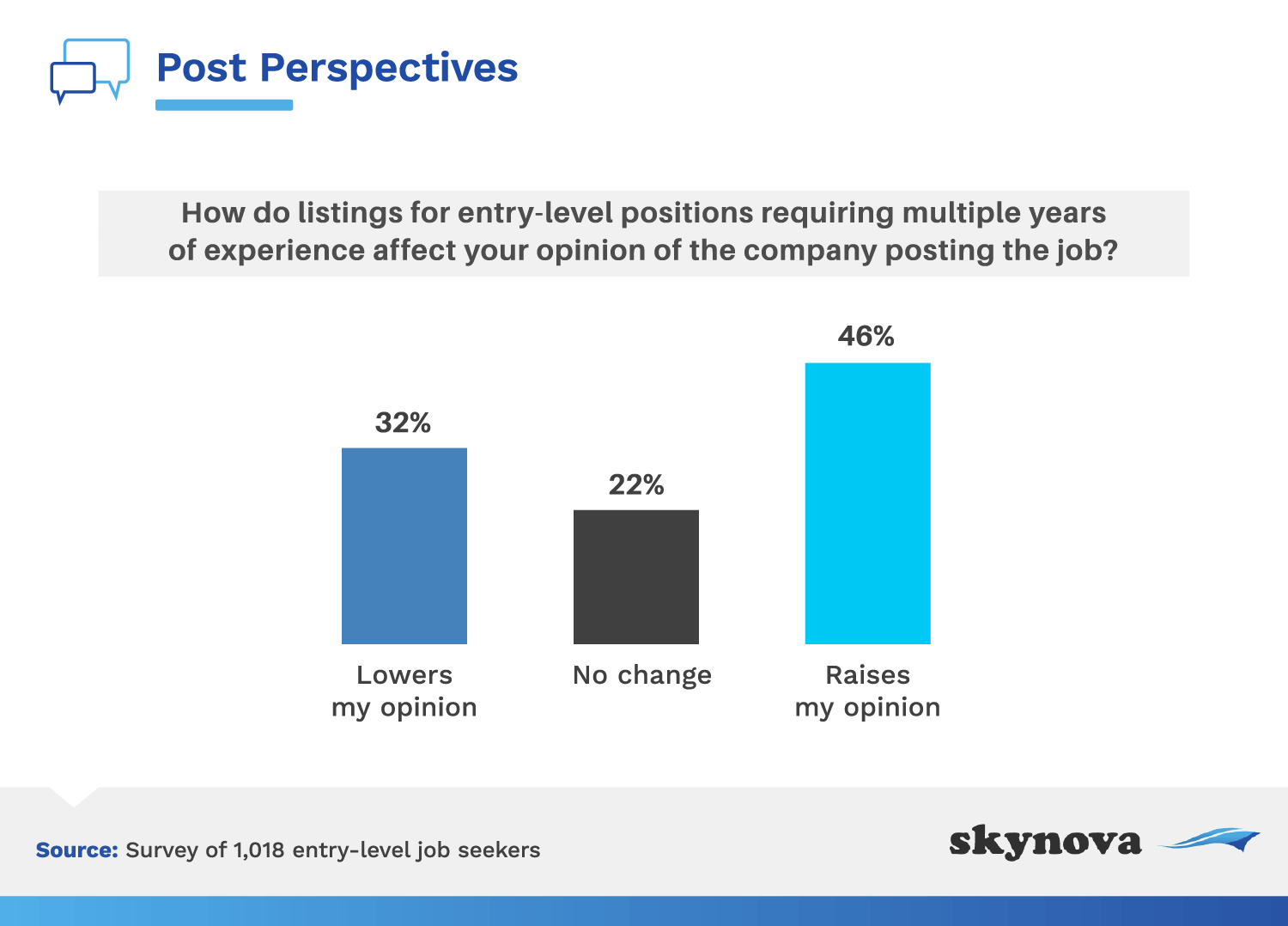
Job seekers 35 years and younger were more likely to think less of companies with experience limitations on entry-level jobs (35%) than job seekers over the age of 35 (27%). The reverse was also true: Older job seekers were more likely to think highly of these companies. Women were also more likely (37%) than men (26%) to think less of a company for multiyear experience requirements. Those with fewer educational credentials (either a high school diploma, GED, associate degree, or trade school) were roughly three times more likely to think less of companies that require multiple years of experience. Through these patterns, we can begin to see that older generations and those with more education tend to respect companies that exclude applicants with less experience, perhaps seeing such exclusivity as a sign of prestige or quality.
Experience and skill level in a job posting are supposed to attract the right kind of candidate and that often means that job seekers are skipping over postings for which they lack skills or experience. However, some applicants are not dissuaded. Our study showed that 33% of employees were very or extremely likely to apply for an entry-level job when they lacked the skills listed in the description, and 34% said the same when it came to experience listed.
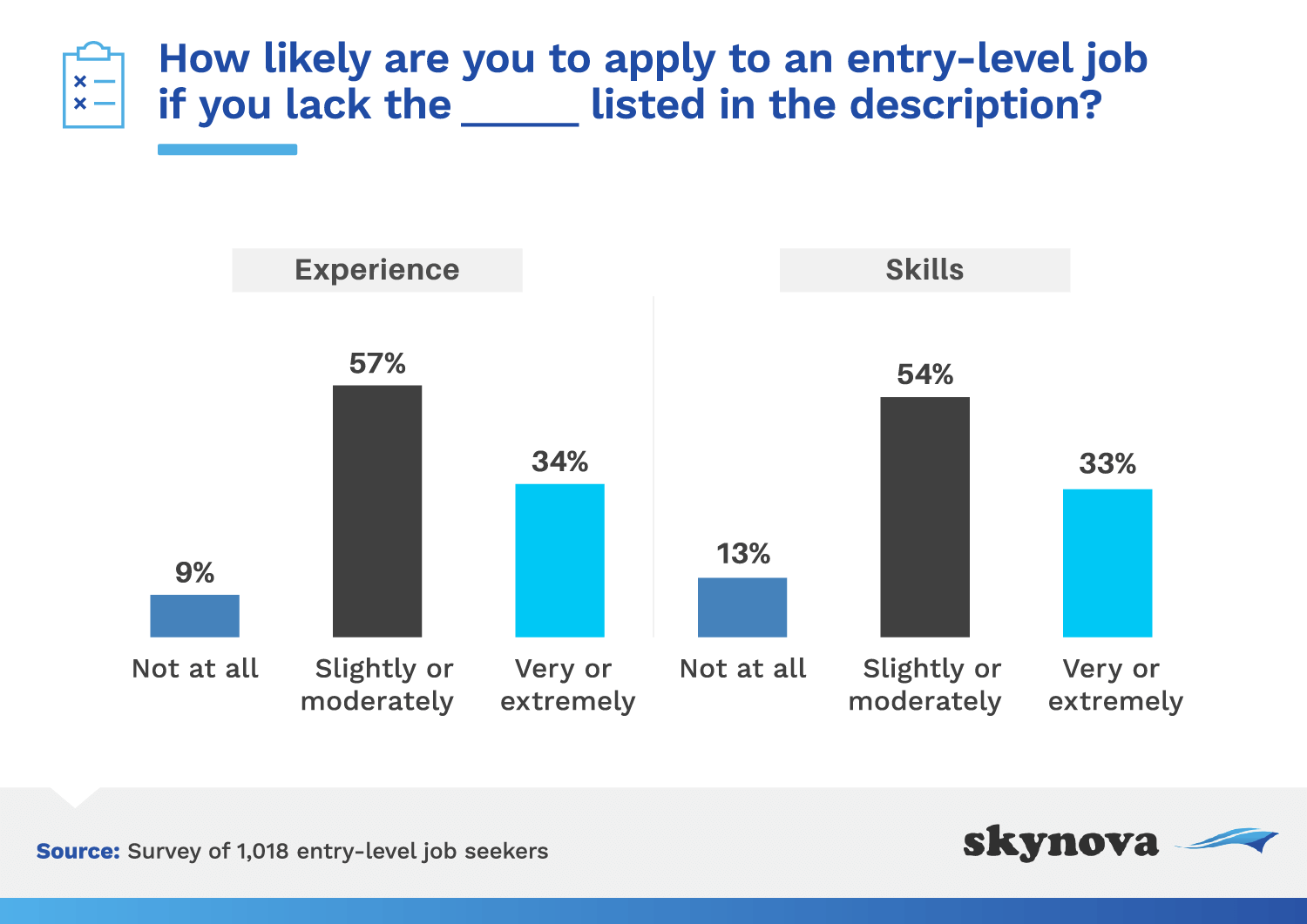
Some may apply for jobs and exaggerate parts of their application materials, perhaps to make up for areas where they lack (such as years of experience). This is, of course, not the best idea overall, but some still fudge slightly to give themselves a better chance at a position. Our study showed that there wasn't a particular age group that was more likely to be very or extremely inclined to exaggerate on their resume, but far fewer 18- to 25-year-olds than other age groups reported being "not at all likely" to exaggerate about interpersonal skills, job duties, and achievements.
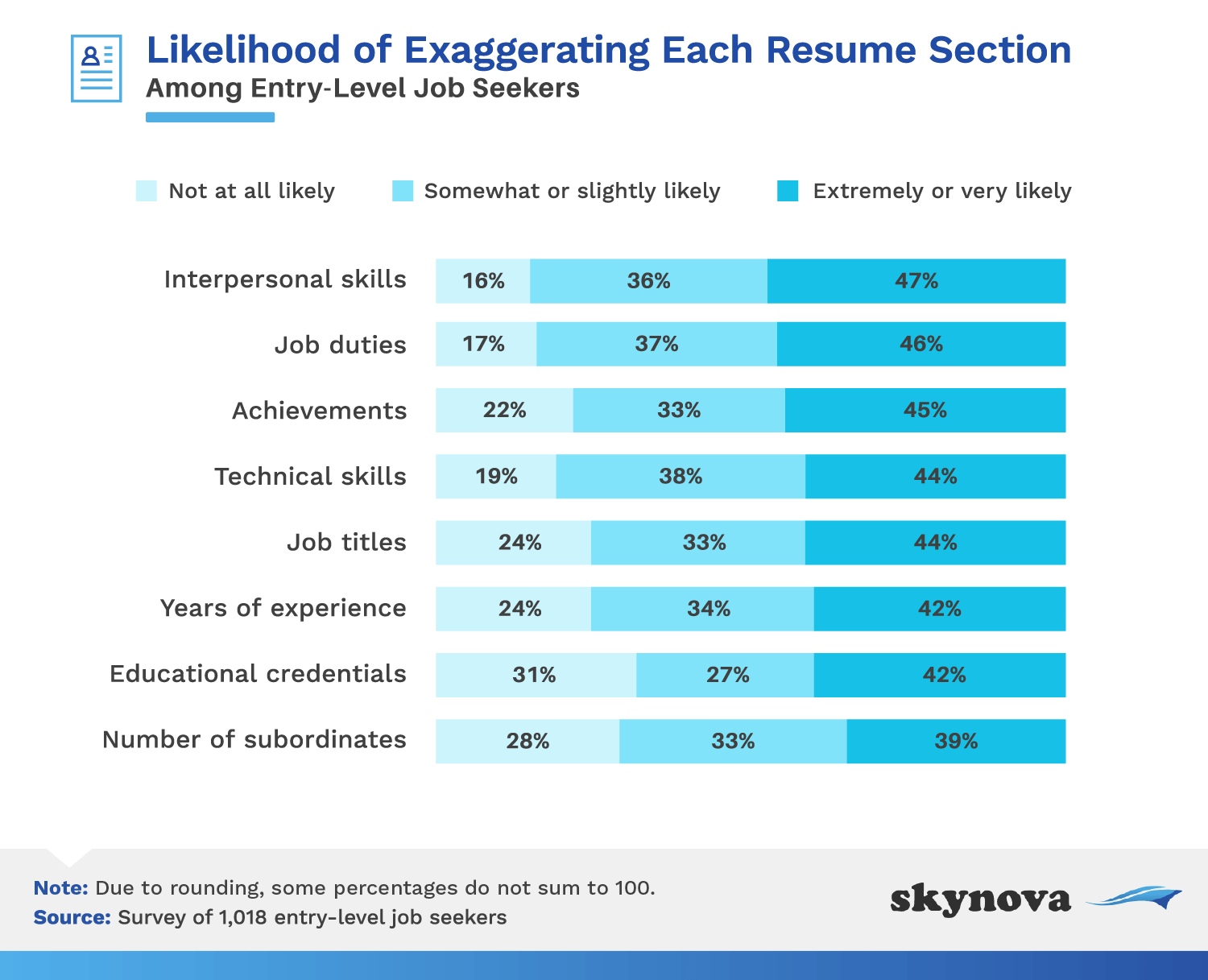
The biggest thing that job seekers were very or extremely likely to exaggerate about on their resume (47%) was their interpersonal skills. Educational credentials inspired the most honesty, with nearly a third of job seekers saying they would never exaggerate such information when vying for a position.
It's important that job seekers have their voices heard in this ongoing debate, but the truth is that they're only one half of the equation. We wanted to get the full picture on entry-level experience requirements, so we asked hiring managers to weigh in with their perspectives. Why do those in charge of entry-level hiring often require experience, and have their strategies changed in recent years?
According to our survey of hiring managers, there are some discrepancies between the perspectives of hirers and job seekers when it comes to the number of entry-level positions that require years of prior experience. A vast majority (93%) of hiring managers said that their company typically requires fewer than three years of experience for entry-level positions, which is incongruous with job seekers' estimate that 55% of entry-level positions require three or more years' experience. Could prospective employees be overestimating the extent of the issue, or are hiring managers unaware of the outsized share that such positions hold in the job market?
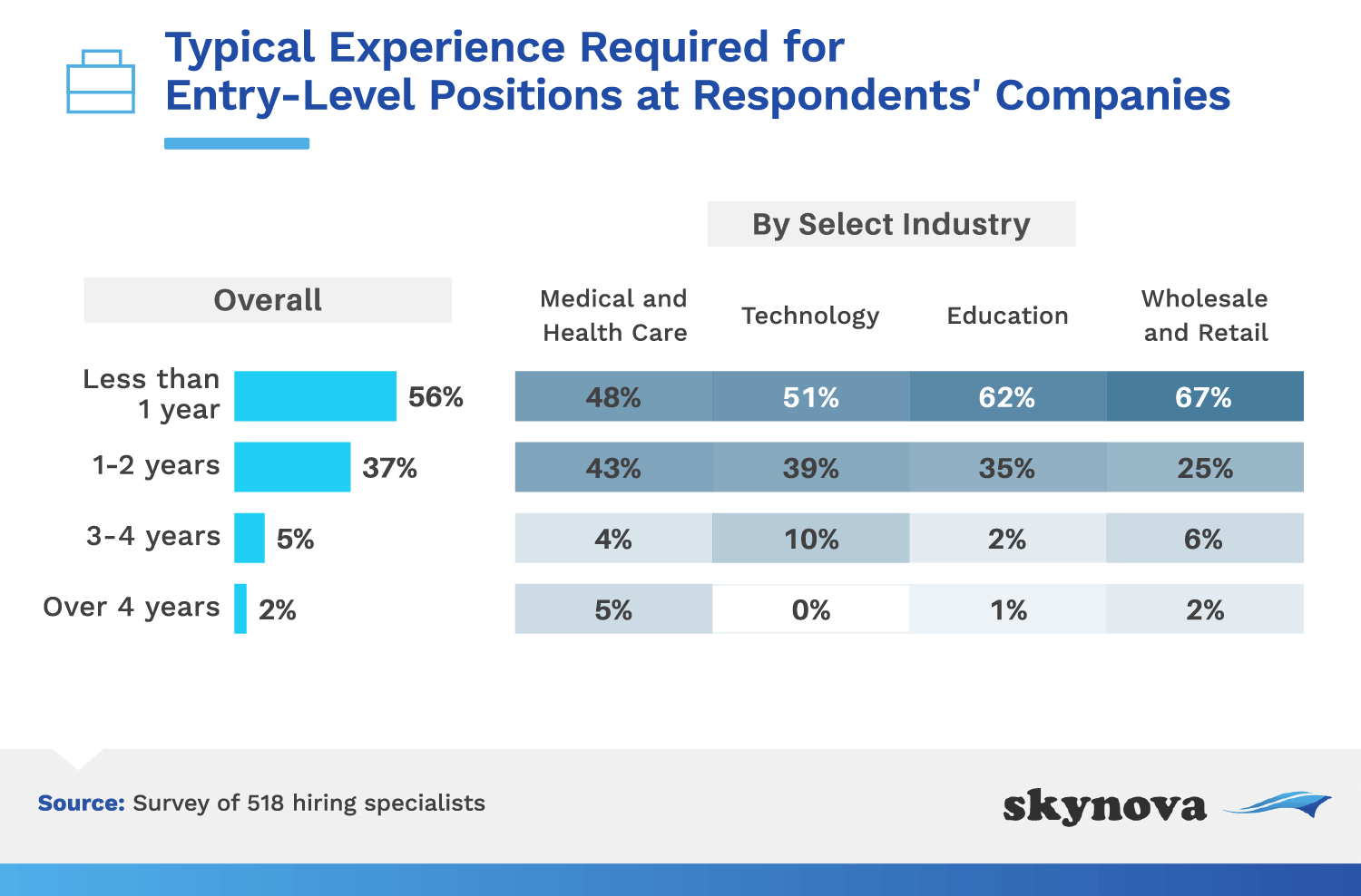
It's notable that these requirement rates didn't vary significantly by the size of a business or whether the company was remote, on-site, or a hybrid of the two. However, they did vary in a somewhat expected fashion by industry; those with higher turnover rates and lower educational requirements expected less experience for entry-level positions.
As mentioned above, experience requirements are sometimes used to weed out underqualified applicants. On average, hiring managers said they estimated that 1 in 3 entry-level job applicants were underqualified, which lines up closely with the percentage of job seekers who admitted that they'd be likely to apply to positions despite not meeting experience or skill requirements. However, less than a quarter (22%) of hiring managers said they felt that prior work or internship experience was critical for an entry-level position, and more than half (54%), notably, said it was either only slightly or not at all important to an entry-level job. Fully remote companies were less likely to report experience as important.
Due to increased hiring difficulties in 2021, some companies have changed their policy on requiring prior experience for entry-level positions. Thirteen percent of hiring managers said they were forced to adjust their job descriptions and requirements for over half of their entry-level positions over the past year due to a lack of applicants.
As it turns out, changing experience requirements for entry-level jobs was a somewhat common event over the past year: Our data showed that more than 1 in 5 (22%) hiring managers made such adjustments. Of this number, 63% now required less experience than before.
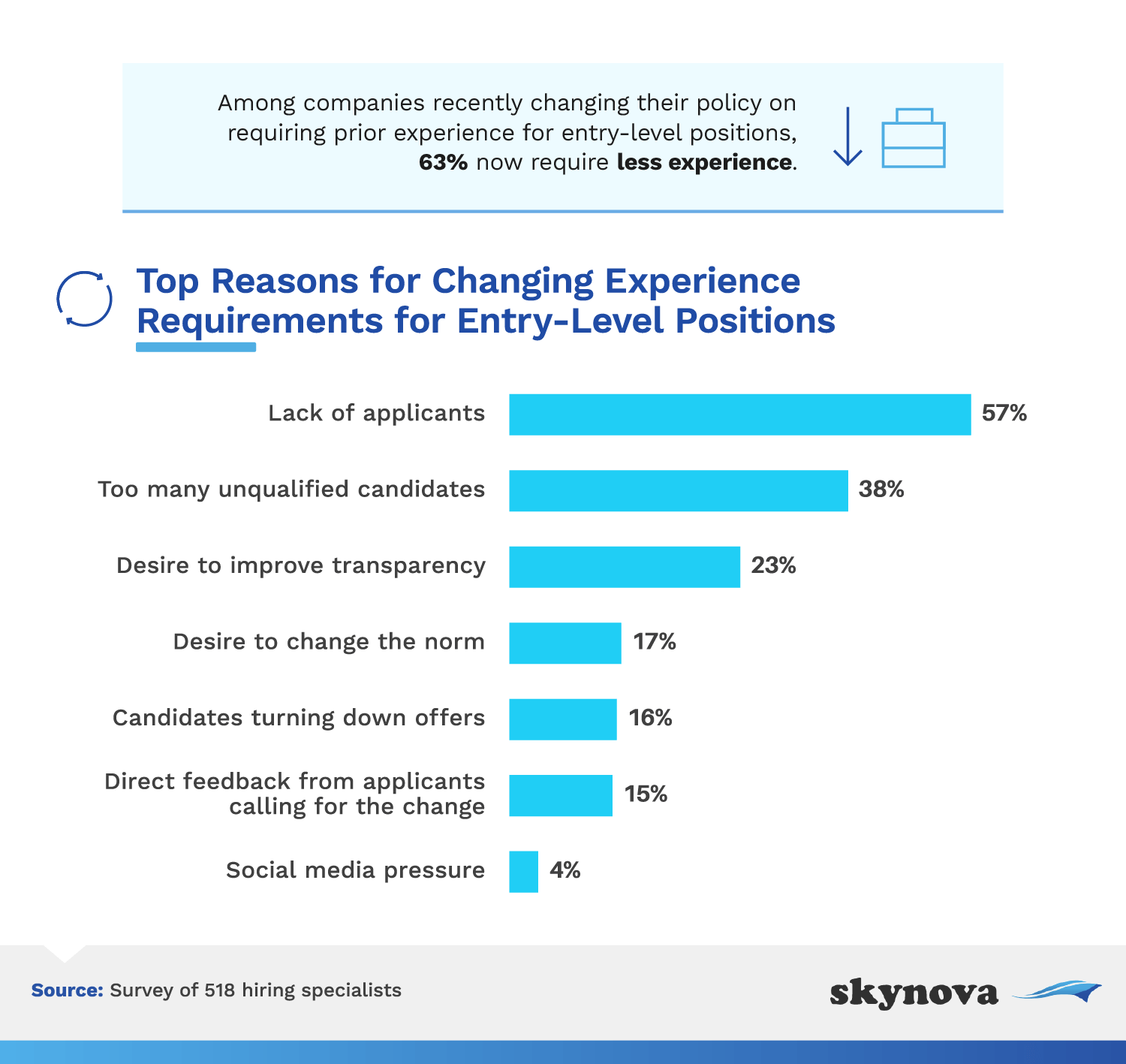
The reasons for such changes were diverse, but the most common was a lack of applicants. More than half of companies that changed their experience requirements for entry-level positions did so because they were not receiving enough applications. Thirty-eight percent changed their policy due to receiving too many applications from unqualified candidates. Another common sentiment was a desire to improve transparency, which was a driving force behind the decision to change experience requirements at nearly 1 in 4 companies.
Overall, it certainly seems that even hiring managers don't find it necessary to require multiple years of experience for entry-level jobs. The reason for these requirements seems to come down to weeding out candidates, but there is serious concern among job seekers that the experience requirements are too strict for candidates looking for entry-level work. This has led to discouragement among job seekers, and many have even avoided certain job applications because they don't meet the requirements. What's more, tactics meant to exclude unqualified applicants have an outsized impact on certain groups, such as newer workers and those with fewer educational credentials.
Considering the labor shortage that has plagued the job market over the past year and a half plus, hiring managers should listen to the concerns of job seekers. After taking a second look at their standards for entry-level positions, perhaps they can find the best candidates regardless of their experience level—even in situations where the experience requirements might not be as specific as other companies.
If your small business is looking to stay organized and on top of the needs of your clients, customers, and employees, Skynova's easy to use and effective invoicing software may be able to help. On top of the services and products we offer, we also regularly publish our research into workplace issues and their connections to broader social issues. To make sure our data is interesting, valuable, and well-sourced, we use both primary and secondary sources to find and analyze key points before producing our final results.
For the survey of job seekers, we surveyed 1,018 adults in the U.S. who had been searching for entry-level jobs within the past two years. The mean age of respondents was 33 years. 160 of these were ages 18 to 25 years old, 447 were ages 26 to 35 years old, 230 were ages 36 to 45 years old, 117 were ages 46 to 55 years old, and 64 were over the age of 55. Men slightly outnumbered women, 538 to 472. Eight respondents were of a different gender, no gender, or declined to disclose their gender. Seventy-five respondents had less than one year of experience in their desired field, while 279 had more than five years of experience, and the remaining 664 had between one and five years' experience.
Relevant samples of highest level of educational attainment were as follows:
For the survey of 518 hiring specialists, 144 came from small companies (fewer than 50 employees), 122 from midsize companies (50–250 employees), and 252 from large companies (more than 250 employees). 132 were working remotely, 294 were working on-site or in the office, and 92 were working a hybrid model.
Relevant samples of company industries were as follows:
To help ensure that all respondents took our survey seriously, they were required to identify and correctly answer an attention-check question.
Survey data has certain limitations related to self-reporting. These limitations include telescoping, exaggeration, and selective memory. We didn't weight our data or statistically test our hypothesis.
If you're an employee or job seeker navigating the difficult market and you're interested in sharing our findings, you're welcome to do so! We ask only that you link back to this page and that your purposes in doing so are noncommercial.